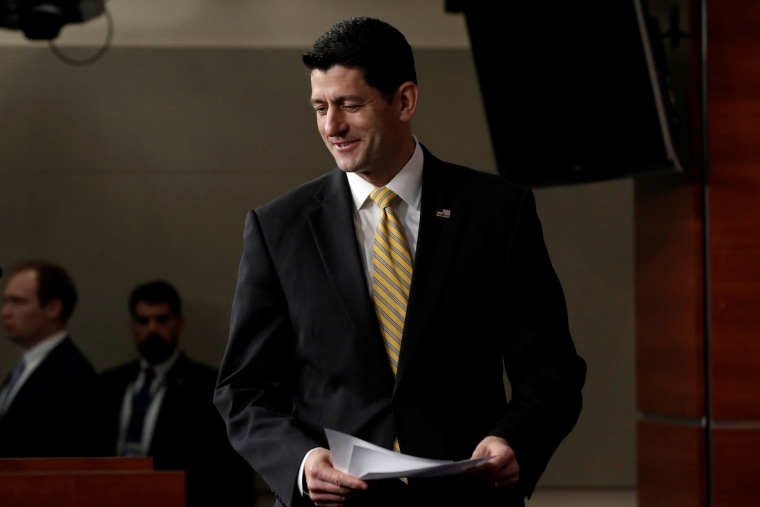House Republicans have unveiled a long-anticipated plan to dismantle and replace the Affordable Care Act, former President Barack Obama's signature health care achievement, that includes scrapping a requirement for individuals to purchase health insurance.
The cost of the proposed bill, dubbed The American Health Care Act, is still uncertain, but the measure would undoubtedly reduce the number of those insured, a central goal of the ACA, better known as Obamacare.
The bill was released Monday night by top Republicans on the two House committees that oversee health care after more than two months of crafting that involved White House officials.
The bill delivers on a promise made by top Republicans for years and by then-candidate Donald Trump that repealing and replacing Obamacare would be priority No. 1.
"Skyrocketing premiums, soaring deductibles, and dwindling choices are not what the people were promised seven years ago," House Speaker Paul Ryan, R-Wisconsin, said in a statement. "It's time to turn a page and rescue our health care system from this disastrous law.
"The American Health Care Act is a plan to drive down costs, encourage competition, and give every American access to quality, affordable health insurance," Ryan said.
He reassured Americans that the bill would protect patients with pre-existing conditions and would offer a stable transition for those enrolled in insurance on state-run Obamacare exchanges.
Trump marked the release of the proposed bill with a tweet, saying "Time to end this nightmare."
The elimination of the so-called individual mandate would disrupt a key component of Obamacare that greatly expanded the number of people with insurance.
The proposed bill would also eliminate the subsidies that help people with low incomes purchase insurance and replace them with more limited tax credits. It would also freeze the Affordable Care Act's expansion of Medicaid, likely reducing the number of people on the government assistance program.
Rep. Kevin Brady, the top Republican of the House Energy and Commerce Committee and co-author of the measure, insisted that the bill is the end of Obamacare.
"It is Obamacare-gone because we repeal all those taxes, those mandates, those subsidies. There is nothing left there," he said Monday on Fox News.
Here are the details of Republicans' proposed health care system.
Replacing Obamacare
Tax credits: The bill would provide tax credits that could be obtained in advance for people to buy insurance based on age. Under Obamacare, people get subsidies to buy health insurance based on income.
Under the GOP plan, 20-year-olds could get tax credits worth $2,000, and the credits would grow the older a consumer gets. A 60-year-old could get a $4,000 tax credit.
The tax credits would start to be reduced for a person making more than $75,000 and for a couple making more than $150,000 to ensure that high-income patients' insurance wasn't being federally subsidized.
Health savings accounts: The bill would expand the incentive to use so-called health savings accounts by doubling the allowed contribution to more than $6,000 per person and $13,000 for a family.
Medicaid: In 2020, Medicaid expansion would be frozen and new people would be barred from enrolling under the income-based system. The new way to provide coverage would allow states to implement eligibility based on population, essentially putting capping the number of people who could enroll in the government program for low-income people.
Planned Parenthood: The measure would strip funding for Planned Parenthood for one year.
What would stay
The measure wouldn't fully repeal Obamacare. It would keep some of the most popular components of the Affordable Care Act, including an assurance that people with pre-existing conditions could keep their insurance. It would als allows people under age 26 to stay on their parents' insurance.
What's next
Two House committees, the Energy and Commerce and Ways and Means committees, will examine their parts of the bill on Wednesday, when changes could be made. The bill must then go to the Budget Committee and the Rules Committee before heading to the full House, which Republicans hope will happen before Easter.
The bill has undergone several changes since a draft was released less than two weeks ago to appease a more conservative bloc of Republicans who had slammed the bill as "Obamacare-lite."
Rep. Mark Walker of North Carolina, head of the conservative Republican Study Committee, said the bill was moving in "the right direction."
"We are carefully reviewing this legislation looking in three main areas of shared conservative concern: protection of the unborn, elimination of Obamacare's Medicaid expansion and ensuring the tax credits are fiscally responsible," he said.
Some conservative members, however, are not sold.
Driving conservatives' concerns, in part, is not knowing how much the new health care plan would cost. The nonpartisan Congressional Budget Office has yet to release a score of the bill. Backers of the bill said simply ending the Obamacare subsidies would pay for their plan.
"I would want to know the score, you know, what is the coverage and what is the cost, absolutely," said Sen. Bill Cassidy, R-Louisiana. "I'm trying to be diplomatic."
And four Republicans in the Senate, including Rob Portman of Ohio, who comes from a state that expanded Medicaid, and Shelly Moore Capito of West Virginia, another state with a large Medicaid population, placed a marker in the sand.
They expressed concerns Monday night in a letter to Senate Majority Leader Mitch McConnell of Kentucky less than an hour before the House plan was revealed over Medicaid. They cautioned Republicans against from passing a plan that would drop people from the Medicaid rolls.
If those four don't support the bill, it likely wouldn't pass the Senate.


